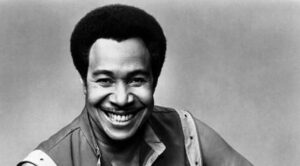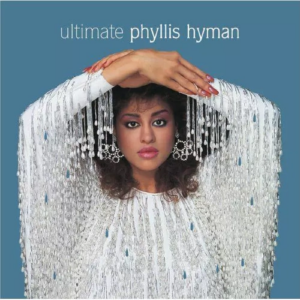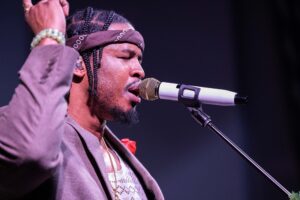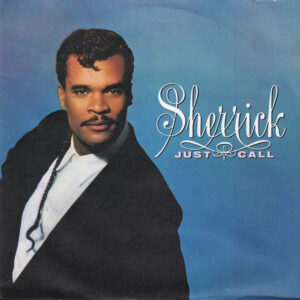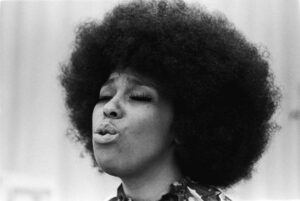Official Biography (courtesy of EarlKlugh.com)
In a recording career of over 35 years, Grammy® Award-winning guitar virtuoso EARL KLUGH has been lauded first as a prodigy and groundbreaker, then a defining figure, and ultimately, as one of the true statesmen of contemporary jazz. With 2008’s THE SPICE OF LIFE, Klugh earns his 12th career Grammy® Nomination – his second straight nomination to follow up his 2005 masterpiece, Naked Guitar, Klugh succeeds in creating a statement every bit as compelling.
After breaking a six-year recording hiatus with the universally-hailed solo album of 2005, Klugh steps back from Naked Guitar’s intimate focus on the unaccompanied guitar to capture the biggest picture possible, and an equally personal one: THE SPICE OF LIFE is a far-reaching account of all his music, marking Klugh’s return to full-scale album production after a nine-year break, with a special guest appearance by flautist Hubert Laws, and with the arrangements of two legendary orchestrators, Don Sebesky and Eddie Horst. It effortlessly segues from jazz to Latin to pop modes through a compositional approach that recalls his Grammy® Award-winning work with Bob James (One on One), spiced with all the lyric flourishes that established Klugh’s distinctive signature all those years ago.
Not surprisingly, the adult-aimed radio stations that have followed Klugh’s music through 23 Top Ten Billboard Jazz Chart albums (five of them No. 1), and 12 Grammy® nominations, have rushed to embrace THE SPICE OF LIFE, with the first focus track “Driftin’” immediately gathering most-added honors in the format upon its release – a loyalty that bespeaks the sustained personal stature, high standards, and restless creative passion of this guitarist’s career. “Driftin’” spent 12 consecutive weeks as #1 on the Radio and Records Smooth Jazz Indicator chart and ranked #1 overall in 2008 on this chart. “Driftin’” is also an iTunes Bestselling Jazz Song of 2008, and is one of Billboard’s Hot Smooth Jazz Songs of 2008. Furthermore, THE SPICE OF LIFE is a Billboard and iTunes Bestselling Jazz Album for 2008, and it continues to receive critical acclaim across the country.
Musical and personal reflections of Klugh’s boyhood and adolescence also underlie the album’s new songs and lovingly chosen standards. In My Foolish Heart, Klugh says, “there are rhythmic concepts from Ahmad Jamal’s Poinciana. When I was 17, I spent time with him at the jazz club in Detroit; and you never forget that, when somebody that great takes time to ask about you and talk about your music. For Canadian Sunset, we took the original piano arrangement by the composer, Eddie Heywood, and elaborated. I love the way Sebesky used the vibes on this tune – combined with the strings and flutes, it creates such chemistry to have that many things working together.” “Venezuelan Nights and The Toy Guitar are my own compositions,” says Klugh, “but they were inspired by the beautiful waltzes written by Venezuelan guitarist/composer Antonio Lauro and the Latin-influenced music I grew up on. These songs are in 6/8 [time], which you don’t hear much in pop records today.”
Imprinted in the album’s many further highlights – whether newly composed or classics re-imagined, performed solo or with his band, acoustic or electronic – listeners can hear the inspirations and enthusiasms of a lifetime. “The orchestrated trio pieces with Don Sebesky were the ones that got me started in the studio,” Klugh notes. “We took the Thelonious Monk song Bye Ya, and changed it to a sort of mutated bossa nova. Ocean Blue is a tribute to Wes Montgomery, and the albums Don Sebesky recorded with him. I love the way Wes wrote original tunes, because they had such immediate melodies, with unexpected chord changes.”
“…a guitarist with impeccable technique.” – The New York Times
“…Klugh is a master of nylon acoustic guitar and fingerstyle technique.” – Downbeat
“This was one of the few times I didn’t pre-plan the sound or direction of the record,” Klugh sums up: “I decided to pick songs,
instead of picking the style. I called the album The Spice of Life because the record went in a number of directions, but the
elements came together so well once we put all the music together.” Bearing all of Klugh’s classic signatures, the album
is imbued with the moving, revelatory and always contagious joy of music. Klugh says that his own experience of musicmaking as something eternally and essentially new is at the center of THE SPICE OF LIFE: “I feel it is important to not only do what you do best, but also try to stretch that range and examine where you can take it.”
In recent times, with the passing of his beloved mother and a subsequent relocation from his hometown Detroit to Atlanta, Klugh had eased up the hectic recording schedule that produced 33 albums in just under 25 years. Even so, he says, “I was touring the entire time, because I love playing and traveling with the band. Then, the solo album (Naked Guitar) was received so well, I got started again in the studio.”
The organic and relaxed, yet typically expressive and adventurous vibe of THE SPICE OF LIFE stems from Klugh’s continued love of composing music, combined with the circle of musicians that he describes as a “safety net and comfort zone.” Klugh notes: “I always use the great players in my touring band. Lenny Price on saxophone and wind synthesizer; David Lee on keyboards, who was with Parliament-Funkadelic; Al Turner and Ron Otis, who you hear on the two hit albums by Kem. It’s a varied group. The trio ensemble portion, with Yonrico Scott and Jeff Cox, comprises almost half the record.” He adds: “I really enjoy playing solo, but with all the ‘alone’ time spent practicing, I really have a good time working with the band. You gain so much through collaboration.”
THE SPICE OF LIFE is the reflection of a lifetime’s discovery, growth and collaboration in music. First studying piano at age 3, and then guitar at 10, Earl was barely a teen when he was thunderstruck by watching Chet Atkins play guitar on Perry Como’s television variety show. “Chet’s playing cast a long shadow on my whole life,” he says, with obvious respect and fondness. “He was the first person I saw playing the melody on guitar, without singing. I had never heard the guitar being played like that.” Immediately, the then 13-year old Klugh immersed himself in Atkins’ innovative fingering style, studying Atkins’ playing on dozens of albums. In honing his technique, a complex, beautiful and melodic style emerged, and a talent that was uniquely Klugh’s.
Working in a local music shop and haunting the Detroit jazz landmark Baker’s Keyboard Lounge accompanied by his mother, Klugh found encouragement from the giants of jazz as a young man: “George Benson was my first and foremost mentor; I worked in his band for a year, at 17. He spent a lot of time with me, and was key in helping me sign my first record deal,” which resulted in the debut album Earl Klugh (Blue Note, 1976). In Detroit, Earl also met pianist Bill Evans, a central songwriting influence; the great saxophonist and flautist Yusef Lateef, later playing on two of his albums; and Chick Corea, whom he briefly joined in Return to Forever’s earliest incarnation. Klugh declined an invitation to join Stevie Wonder on tour to concentrate on his own career, but this too remained a cherished vote of confidence.
Earl absorbed a world of influences in his youth, from Wes Montgomery to Sergio Mendes, to the jazz and classical guitar music of Brazil, Argentina and Spain, the pop songs of Burt Bacharach and the Beatles, and the pop-folk eruption of the early Sixties and Motown’s legendary studio-session band, The Funk Brothers. “Music for me has always been a driving force in my life,” he says. “I love the emotion music evokes, and the stories it tells. No matter the genre, or style, I can always find something to enjoy. Music has no boundaries.” Klugh’s lifelong appreciation of contemporary popular music resulted not in a pastiche of styles, but in a philosophical positioning of his music for the broadest audience of music lovers. As a composer and recording artist, he was counted among the lynchpin figures of a new contemporary jazz, and rightly credited for the extension of his instrument’s artistic scope.
Years after inspiring Earl so crucially — and by then a longtime friend and collaborator — Chet Atkins zeroed right in on Klugh’s forte in Guitar Player magazine, noting Klugh’s use of a profound talent and artistic daring to create a mainstream music. “Earl can wail with the best,” said Atkins, “but he prefers to touch people emotionally. He reaches your heart with that romantic special something.” Klugh’s closeness to his listeners has been a constant of his career and his life: “I’m always amazed that fans are so loyal. So many have shared stories and memories of what my music has meant to them. It’s the most wonderful compliment I could ever receive.”
In recent years, Klugh has toured on nearly every continent, carrying the banner for jazz music, its legendary musicians, and for global social awareness. Joining such legends as George Duke, Stanley Clarke, Al Jarreau, Bob James, Patti Austin and Ravi Coltrane, Klugh has twice traveled on goodwill tours to India, jointly sponsored by the U.S. State Department and The Thelonious Monk Institute of Jazz. Klugh received the honor of 2008’s Best Jazz Concert by the Pittsburgh Post-Gazette, and the New York Times hailed Klugh, “…a guitarist with impeccable technique.” Whether he is performing as a soloist, with his quartet, his electric band, his ‘Little Big Band’ or with renowned symphony orchestras, Klugh’s magic onstage continues to delight audiences worldwide.
His symphonic work is extensive and features a catalogue of over 50 symphony charts orchestrated by Grammy winners Don Sebesky, Dave Grusin, Johnny Mandel and Clare Fischer. Earl also spearheaded the return of jazz to a legendary swing era venue, Colorado Springs’ Broadmoor Resort, where his annual Weekend of Jazz at the Broadmoor has hosted such greats as Al Jarreau, Joe Sample, Roberta Flack, Arturo Sandoval, Chris Botti, Michael Franks, Bob James, Patti Austin, Chuck Mangione, R n R: Rick Braun & Richard Elliot, Jessy J and Spyro Gyra. In 2010 after 7 successful years and counting at the Broadmoor, Klugh expanded the Weekend of Jazz brand to include another annual Weekend of Jazz event on Kiawah Island, South Carolina.
Earl Klugh has recorded over 30 albums in a multi-million-selling career including 23 Top Ten charting records – five of them No. 1 – on Billboard’s Jazz Album chart. He has been nominated twelve times for the Grammy, in jazz fusion, best arrangement and pop instrumental categories, winning the 1980 Grammy for Best Pop Instrumental Performance for the million-selling album One on One with Bob James. He won the 1987 Edison Award for Life Stories (Europe’s Grammy Equivalent). Klugh’s first Koch album, Naked Guitar, was nominated for Best Pop Instrumental Album, as well as his second Koch effort, THE SPICE OF LIFE. Collaboration, his 1987 album with George Benson, was certified Gold by the RIAA. As a composer and songwriter, Earl Klugh’s credit appears on recordings by Aretha Franklin, Jamie Foxx, Roberta Flack, Mary J. Blige, Kenny Loggins, Al Jarreau, and many others. He has been invited to play as a guest artist by such diverse peers and admirers as Jimmy Buffett, Kenny Loggins, Brenda Russell, Stevie Wonder, Miles Davis, and McCoy Tyner. In film, Klugh’s guitar is heard in the soundtrack scores of How to Beat the High Cost of Living, Marvin and Tige, and Just Between Friends.
He has performed on such television institutions as The Tonight Show, Late Night featuring David Letterman, The Today Show,
and Good Morning America. “The essential excitement of music-making is renewed in every studio and stage performance,” Klugh says. “Once I get into the actual song, I try to go back to what made me write the song or decide to perform it. I try to keep myself in an open mind, so I don’t reproduce the record (but instead) create a live performance at that moment. I play it for myself as if it’s the first time I’m doing it. Most of my band members have been with me ten-plus years, like Al Duncan (keyboards, horns). We’re very comfortable with each other. If one of us plays differently than the night before, it sparks a different reaction. Going into something unexpected is great, because the music takes on a life of its own. After all these years, that’s what we try to do.” Even with the many accomplishments of a long career, Earl Klugh doesn’t necessarily believe there is a peak level to playing guitar. In a 2005 interview with Modern Guitars, Klugh reflected, “My enjoyment is searching out new things to play every day, and ways to play them. There’s so much more I want to do. If there were nothing else to learn and do there’d be no reason to play.”
Presenting THE SPICE OF LIFE, Klugh continues to show us just how much he has learned, and makes us hope that his
reasons to play will exist for many years to come.


